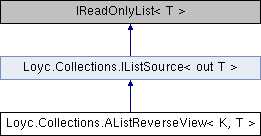|
Enhanced C#
Language of your choice: library documentation
|
|
Enhanced C#
Language of your choice: library documentation
|
A reverse view of an AList. More...

A reverse view of an AList.
Public fields | |
| AListBase< K, T > | _list |
Properties | |
| T | this[int index] [get] |
| int | Count [get] |
Public Member Functions | |
| AListReverseView (AListBase< K, T > list) | |
| T | TryGet (int index, out bool fail) |
| Gets the item at the specified index, and does not throw an exception on failure. More... | |
| ReverseBinumerator< T > | GetEnumerator () |
| IEnumerator< T > IEnumerable< T >. | GetEnumerator () |
|
System.Collections.IEnumerator System.Collections.IEnumerable. | GetEnumerator () |
| IRange< T > IListSource< T >. | Slice (int start, int count) |
| Returns a sub-range of this list. More... | |
| Slice_< T > | Slice (int start, int count) |
| Returns a sub-range of this list. More... | |
|
inline |
Returns a sub-range of this list.
| start | The new range will start at this index in the current list (this location will be index [0] in the new range). |
| count | The desired number of elements in the new range, or int.MaxValue to get all elements until the end of the list. |
| ArgumentException | The start index was below zero. |
The (start, count) range is allowed to be invalid, as long as start is zero or above.
this.Count - start. Implementation note: do not compute (start + count) because it may overflow. Instead, test whether (count > this.Count - start). Most collections should use the following implementation:
IRange<T> IListSource<T>.Slice(int start, int count) { return Slice(start, count); } public Slice_<T> Slice(int start, int count) { return new Slice_<T>(this, start, count); }
Implements Loyc.Collections.IListSource< out T >.
References Loyc.Collections.AListReverseView< K, T >.Slice().
Referenced by Loyc.Collections.AListReverseView< K, T >.Slice().
|
inline |
Returns a sub-range of this list.
| start | The new range will start at this index in the current list (this location will be index [0] in the new range). |
| count | The desired number of elements in the new range, or int.MaxValue to get all elements until the end of the list. |
| ArgumentException | The start index was below zero. |
The (start, count) range is allowed to be invalid, as long as start is zero or above.
this.Count - start. Implementation note: do not compute (start + count) because it may overflow. Instead, test whether (count > this.Count - start). Most collections should use the following implementation:
IRange<T> IListSource<T>.Slice(int start, int count) { return Slice(start, count); } public Slice_<T> Slice(int start, int count) { return new Slice_<T>(this, start, count); }
Implements Loyc.Collections.IListSource< out T >.
|
inline |
Gets the item at the specified index, and does not throw an exception on failure.
| index | An index in the range 0 to Count-1. |
| fail | A flag that is set on failure. |
In my original design, the caller could provide a value to return on failure, but this would not allow T to be marked as "out" in C# 4. For the same reason, we cannot have a ref/out T parameter. Instead, the following extension methods are provided:
Implements Loyc.Collections.IListSource< out T >.
 1.8.7
1.8.7